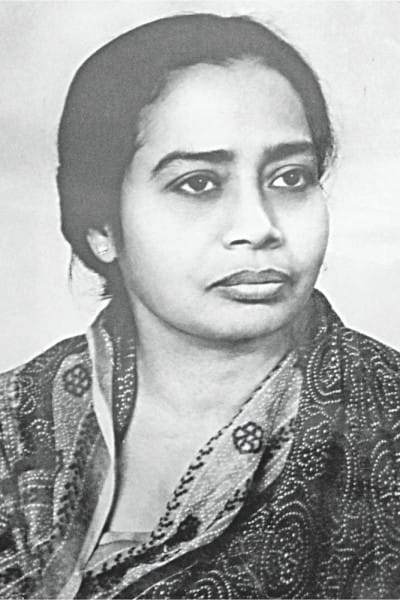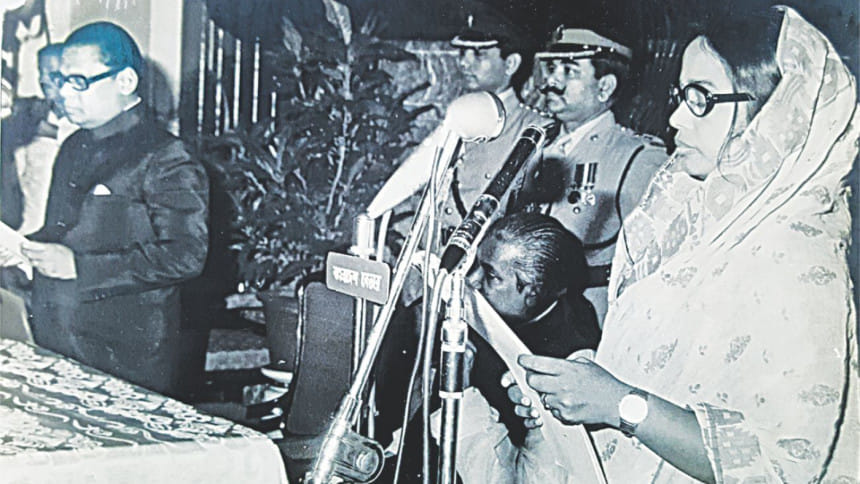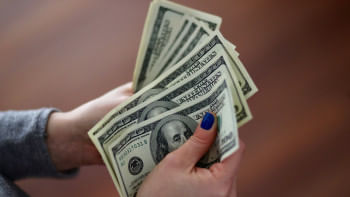A trailblazer for women's empowerment

May 1954 was a tumultuous time in the history of Bangladesh. Although the United Front, a coalition of East Pakistan's major parties, achieved a landslide victory against Pakistan's Muslim League in the East Bengal Legislative Election of 1954, their legislative assembly was forcefully dissolved by the military-backed government. Many leaders of Awami League (which won almost half of the seats—143 out of 309), including Bangabandhu Sheikh Mujibur Rahman, were arrested. In this tyrannical situation, a courageous woman defied section-144 and took out a protest march against this injustice for which she was arrested and jailed for a month. This pioneering female political leader was Professor Begum Budrunnesa Ahmad. She was one of those few women who contested the 1954 elections and achieved victory, creating ripples in the overly male-dominated political culture of the then Pakistan regime. She was elected thrice as a Member of Parliament and became one of the first female ministers of independent Bangladesh. Besides having a very eventful political career, she was also a renowned academician and women's rights activist.
Born to a progressive Muslim family on March 3, 1924, Begum Budrunnesa was a student of Sakhawat Memorial Muslim Girls' High School established by Begum Rokeya Sakhawat Hossain, the legendary educationist and social activist. She passed her matriculation exams from the same school and got admitted to Lady Brabourne College in 1942, which was the premier women's educational institution in Kolkata at the time. In 1943, while she was a student at the college, the great Bengal famine broke out. This tragic incident gave her the experiences to delve into social work for the first time when she volunteered in open kitchens built by charitable organisations to distribute food to the starving.
In 1947, Begum Budrunnesa married Nuruddin Ahmad—an officer in the Forest Services in the British-Indian Government. After her marriage and the partition of Indian sub-continent in 1947, Budrunnesa completed her Bachelor of Arts degree from Government MC College, Sylhet, in 1953. Her role in the language movement of 1952 during her undergraduate years shaped her entire political career. In 1952, when women were hardly allowed to leave the house without a male companion, this spirited woman joined the demonstration in Sylhet city for the demand to declare Bengali as the state language of Pakistan. Her patriotism and her active role in the language movement in the progressive district town of Sylhet did not go unnoticed by the politically conscious citizens. Being encouraged by all quarters especially by her husband, she met Huseyn Shaheed Suhrawardy and Bangabandhu Sheikh Mujibor Rahman. With their blessings and support, she participated in the East Bengal Legislative Election of 1954 under the banner of the United Front. Begum Budrunnesa openly contested in the election from Kushtia, Jessore, Khulna and Faridpur constituencies and defeated her Muslim League opponent by a wide margin. Two months after the victory, Pakistan government forcefully ousted the United Front's legislative assembly. However, even this oppressive measure could not stop her and she doubled her efforts to establish the rights of her countrymen. In 1957, she had the honour to represent East Pakistan at the United Nations Commission on the Status of Women.
In 1960, Budrunnesa started her teaching career at Muslim Girls' High School. Alongside her teaching career and political activities, she completed her Master of Education degree from the University of Dhaka in 1961. She also completed another Master's course in political science from the University of Dhaka in 1963. Thus, unlike Bangladeshi political leaders today, Budrunnesa continued her higher education alongside her political and social engagements. In 1960, she joined as Vice Principal at Lalmatia Mohila College, where she served for 13 years till her retirement in 1973 as its Principal and as a founder member of its governing body.
Budrunnesa's political activism reached new heights when Awami League (AL), led by Bangabandhu, began its Six-Point Movement in 1966. To accelerate the movement and ensure the participation of women, Bangbandhu directed her to launch a women's wing of the party. Thus, Begum Budrunnesa became the founding chairperson of the women's wing of AL. As a part of the movement for the Six-Point Demand, Budrunnesa then founded the Gana Shanskritik Parishad, which was an open cultural platform that pioneered the cultural movement against Ayub Khan's regime spearheaded by prominent cultural personalities such as Ehtesham Haider Chowdhury, Mustafa Sarwar, MA Hamid and Aminul Huq Badsha. In 1970's general election, Begum Budrunnesa was elected as MP under Awami League's ticket. This time, Pakistan's military regime led by General Yahya Khan refused to hand over the government to Bengalis, which ultimately culminated in the Liberation War of 1971.

During the war, Begum Budrunnesa was separated from her family members for quite a couple of months. Later, she crossed the border through Comilla town and entered India to join the war. During the war, she worked with Sarada Seva Sangha and Ramakrishna Mission to distribute essential food and medicine among the refugees. She frequently visited different refugee camps and submitted reports to Tajuddin Ahmed, Prime Minister of the Bangladesh Government in exile. After liberation, Budrunnesa established the Bangladesh Women's Rehabilitation and Welfare Centre to shelter, train and help rehabilitate women affected by the war and Birangonas in particular. In 1973, she was re-elected as MP and served as the State Minister for Women, Education, Sports and Cultural Affairs.
Over the span of her career, Budrunnesa mentored many famous political personalities of Bangladesh. Prominent parliamentarians Syeda Sajeda Chowdhury, Ivy Rahman and former Minister of Home Affairs Advocate Sahara Khatun started their political career under her wing. According to Sahara Khatun, “Begum Budrunnesa pioneered women's participation in Bangladeshi politics. She suggested the involvement of more women in politics through welfare activities. In the late 60s, under her leadership, we used to visit women to help them with their household chores and look after their children and ailing relatives. This was done to gain their confidence in Awami League so that they could join the women's wing of AL and work for Bangladesh's independence.”
As the closest neighbour of Bangabandhu, Begum Budrunnesa gained respect and love of all the family members of Bangabandhu. She had the opportunity to discuss with Bangabandhu about the issue of women's rights in independent Bangladesh. “Bangabandhu's and Budrunnesa's houses were connected by a door. She was like family to him. She motivated him a lot to amend laws that had discriminatory provisions against women such as the Marriage Act, Divorce Act, etc. She also emphasised the need for secularism and gender equality in every aspect of the state,” adds Sahara Khatun.
Budrunnesa was as engaged in her duties as a teacher, political leader and women's rights activist as she was as a mother. All of her sons and daughters are well established in their own fields. Her eldest daughter Professor Dr Nasreen Ahmad is the longest-serving and second female Pro-Vice Chancellor of the University of Dhaka. She says, “My mother was a very independent, open-minded and progressive woman. Besides ensuring our proper education, she encouraged us to learn art, music and participate in different types of cultural activities. She instilled in us moral values, discipline and a love for all that is Bangali which we still uphold in every aspect of our lives.” Professor Dr Nasreen also adds that her father Nuruddin Ahmad's support was crucial for Budrunnesa's political activism. Being a civil servant, Nuruddin had to go through a lot of hardships from the government especially under martial law for his wife's political involvement. He was even suspended and then forced to retire early during Ayub Khan's regime, but his support for Budrunnesa never faltered.
Begum Budrunnesa died of cancer on May 25, 1974, at the age of 50. She served as State Minister till her death. After her demise, Sheikh Mujib called her “one of the most heroic personalities of Bangladesh's struggle for liberation” and changed the name of Bakshibazar Government Women's College to Begum Budrunnesa Government Women's College. She was awarded the Independence Day Award posthumously in 1999. During her short life, Begum Budrunnesa Ahmad contributed tremendously to the political, social and cultural emancipation of Bangladeshi men and women. However, it is unfortunate that she did not have enough time in this world to write any personal accounts or books for the next generation. Many of her efforts have already been forgotten in the midst of the country's partisan politics. It is our duty to preserve the contributions of this historically significant personality whose brief life was so closely entwined with the history of our nation's liberation.
The writer can be contacted at [email protected].

 For all latest news, follow The Daily Star's Google News channel.
For all latest news, follow The Daily Star's Google News channel. 



Comments